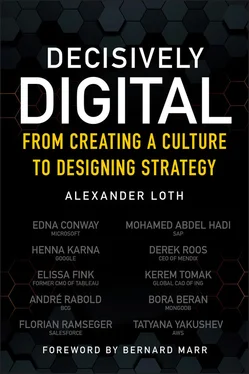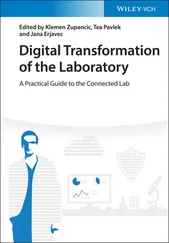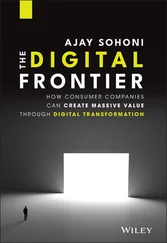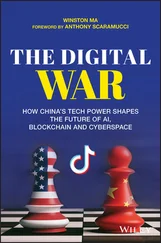Second, they should have done earlier what some taxi companies eventually did: they got together and introduced a taxi app.
Alexander: And how can companies increase their digital maturity? Which technologies or digital capabilities are essential for a digital strategy?
Florian:It depends of course on the industry, but it is no secret that machine learning and other forms of artificial intelligence are today's game changers.
I like to say that AI helps organizations “outsource decision-making to computers,” thereby allowing them to automate more of their existing business processes and create new offerings that were unthinkable only a few years ago.
The classic example of process optimization is banks that use algorithms to automatically approve loan applications that meet certain criteria. Some of the more innovative use cases that we have already talked about, whether self-driving cars, ride-sharing services, or smart toilets, demonstrate the potential this technology has for new products in all sorts of fields.
Alexander: But will every decision eventually be outsourced to computers?
Florian:No. While the realm of what AI can be used for will increase drastically over the next few years, there are still plenty of business decisions to be made every day that can't be automated, either because we don't have enough historical data or because we don't feel comfortable surrendering that decision.
This is where the often-cited data-driven decision-making comes in; I actually prefer to call it data-informed decision-making, because at the end of the day it is still the human who will make the decision. You want the human to be able to do so, after having consulted the available data. For that you need technologies that allow everyone in the organization to have access to the organization's data and to make sense of it — business intelligence (BI) tools.
Alexander: What other technologies are interesting besides AI and BI?
Florian:Cloud computing will continue to change things. Here in Europe especially, I see companies catching up in this space. Both in terms of the physical servers that their own app offerings live on, but perhaps even more so in terms of software as a service (SaaS) applications. It started with tools like Workday, which allows you to manage employee leave applications, but nowadays there is an off-the-shelf SaaS tool for almost any type of business process.
Cloud offerings like Amazon Web Services, Microsoft Azure, and Google BigQuery also allow companies to build their own applications and help power a lot of the AI and BI processes that we just talked about.
Besides these broad-scale technologies there are innovations that might be more specific to certain business processes or industries. Blockchain will enable fast verification of all sorts of transactions. Lamborghini, for instance, uses blockchain technology to certify the authenticity of their vintage cars. Buyers can follow the history of the car and all its spare parts and thus be assured about what they are purchasing.
But you could imagine applications that are useful not only for the super-rich. Anyone who has ever bought or built a property knows that it takes weeks to clear many bureaucratic hurdles. What if building permits could be issued via blockchain technology? What if a contract could be notarized with the push of a button?
Fast, reliable business transactions will be like grease to our modern business machinery. At the same time, by making transactions transparent, it could mean the end for another type of “grease,” namely, bribery, kickbacks, and other corrupt practices that endanger the trust of our societies.
Alexander: How can technology shift the roles and responsibilities of the workforce? You mentioned the commoditization of modern digital technologies before .
Florian:First, we already talked about how everything that can be automated will eventually be automated, whether it is capturing or presenting information (what we called stage one), transmitting information (stage two), or making inferences from that information (stage three). Therefore, fewer of those tasks will be done by humans.
Instead, your employees will generate new ideas, create new content, and make decisions that can't be based on historical data. The role of the knowledge worker will continue to become more important. In many organizations it is, for example, common for someone to take notes during a meeting and share them with the rest of the team afterward. AI-based transcription services can now automate that task for you. That means that that person who used to have their head buried in the notepad now can join the discussion and contribute new ideas.
Second, and this is where the commoditization of digital technologies comes in, everyone will in some ways become involved in setting up new automated processes, whether that is by working with ready-made SaaS offerings or by creating customized services with so-called low-code platforms.
We are even seeing first products that commoditize machine learning so that anyone can deploy AI technology on their data.
The integration of separate services also will become more prominent as B2B companies offer more holistic offerings, such as the Salesforce Customer 360 platform. Offerings such as those by MuleSoft allow you to string together your different data sources and the individual steps of business processes.
At a simpler level, the online tool IFTTT, which stands for “If This Then That,” lets anyone connect their popular business apps with one another, including Outlook, Google Sheets, Asana, and many more. For example, you can easily connect your SurveyMonkey form to Slack so that you can be notified when a new survey response has come in.
In other words, many things that traditionally were done by IT can now be done by the subject-matter experts themselves. Therefore, the role of IT changes too. It is more about managing and enabling, as opposed to creating new systems.
Alexander: How can companies today prepare their employees to achieve organizational readiness for the digital future?
Florian:Everyone should have a basic understanding of how machine learning works. I don't mean that everyone should know how to code, but they should be able to explain the concept to their grandmothers so that they can evaluate the potential of using AI-powered applications in different business processes.
Given how AI changes our everyday lives, I would recommend that everyone take the free online course “Elements of AI” that was created by the University of Helsinki.
I would also make sure that all my employees have some basic data literacy skills to be able to take part in the conversations. Once, when explaining some research findings in a meeting, I had a participant ask halfway through, “Why are we looking at all this data in the first place, when statistics is all lies anyway?” I had to take a long detour to explain the fundamentals of what we were doing.
Alexander: What can managers do to develop and foster the company's digital culture?
Such a culture would be one of collaborative problem solving, innovation, and constant introspection. Now, there are many factors that influence a company's culture, but here are a few things that any manager can practice.
First, encourage employees to point out problems and inefficiencies. I know an organization where every day a certain boring and time-consuming task is performed, involving the manual transfer of content from one system into another. For over 10 years, complaints by employees fell on deaf ears. Some employees were admonished for their lack of enthusiasm. Not surprisingly, attrition is high on that team. A simple upgrade of the system that would automate the bulk of the process could have saved many labor hours and, more importantly, the morale of the team.
Читать дальше












